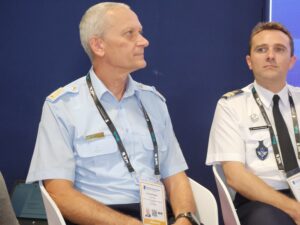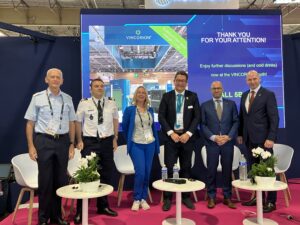Green Defense at Eurosatory 2024: A Paradigm Shift in Security Policy
Eurosatory 2024, one of the world’s leading trade shows for defense technology, was not only the venue for impressive hardware and innovative solutions this year, but also provided a platform for important debates about the future of the industry. A panel of high-profile speakers addressed the topic of green defense and shed light on the challenges and opportunities involved in creating a more sustainable defense industry. With Dorothee Frank (cpm Defense Network) as moderator, experts from the worlds of industry, the military, and politics discussed the urgent question of how armed forces can improve their carbon footprint without compromising their operational readiness.
Two Wars, One Challenge
Sascha Brüning, Vice President Business Development and Sales at VINCORION, a leading supplier of military power systems, opened the discussion with an urgent appeal, saying: “We are in the midst of two wars: one is raging in Ukraine, the other is a global battle against climate change. Both conflicts present us with immense challenges and require decisive action.”
Brüning emphasized that the defense industry plays a key role in overcoming these challenges. “We have to reduce our dependence on fossil fuels in order to strengthen our strategic autonomy and at the same time do our part to combat climate change. At the same time, we must not forget that sustainable technologies can also improve our military capabilities.”

In his keynote speech, Sascha Brüning called for decisive action for green defense.
An Action Plan for the Post-2030 Landscape
Dr. Constantinos Hadjisavvas, project officer at the European Defence Agency (EDA), underlined the urgency of the issue. “The EU and NATO have recognized that we need to prepare our defense systems for the post-2030 landscape. We need an action plan to get our armed forces fit for this new reality.” The defense industry must fit into a future in which, for example, electric vehicles and renewable energies will be the norm in the civilian sector.
Hadjisavvas outlined a comprehensive approach that encompasses 23 different fields of action – from the development of low-emission vehicles and aircraft to the use of artificial intelligence for more efficient logistics. “It’s not just about improving individual technologies, but about a fundamental change in the way we think. We have to view sustainability as an integral part of our defense strategy.”
Tactical Advantages and New Business Models
Daniel Zeitler, Head of Product Management at VINCORION, explained on the panel that sustainability and tactical superiority don’t have to be mutually exclusive. “Modern energy systems are more flexible, scalable, and can also be supplemented with solar power. Through the use of battery storage systems and efficient energy management alone, we can reduce fuel consumption by up to 40 percent, giving the armed forces a decisive advantage in operations.”
Zeitler explained how modern energy systems can reduce the burden on logistics, extend deployment times, and increase tactical flexibility. “Our hybrid power solutions for the Patriot air defense system and the new tactical energy systems for the German Armed Forces are two prime examples. They enable the troops to operate more independently of fossil fuels and to use electricity from the grid or renewable sources wherever possible.”

Colonel Robert Šipec and Raphael Danino-Perraud provided insights into the practical implementation.
Long-Term Planning and International Collaboration
Colonel Robert Šipec from the Slovenian Ministry of Defense emphasized the importance of long-term planning. “We are procuring equipment that will be in use for decades. Spare parts also need to be available after 2050. Climate change doesn’t stop at political borders, which is why international collaboration is essential.”
Šipec emphasized that Slovenia has already taken concrete steps to make its armed forces more sustainable. “We’ve introduced a comprehensive energy management system, renovated our buildings to make them more energy efficient, and are increasingly focusing on renewable energies. We are also working closely with both the industry and academia to develop and test new technologies.”
Raphael Danino-Perraud from the French Ministry of Defense added: “Energy efficiency is not only a question of cost, but also of strategic autonomy. We must reduce our dependence on fossil fuels in order to safeguard our operational capabilities.”
Danino-Perraud presented the French initiatives to decarbonize the armed forces, including the development of hybrid vehicles, the use of biofuels, and research into new propulsion technologies. “We are convinced that green defense is not only possible, but also necessary to ensure the long-term security of France and Europe.”

Daniel Zeitler and Dr. Constantinos Hadjisavvas see sustainability as an integral part of defense strategy.
The Role of Industry and Politics
The panelists agreed that the transformation to a greener defense requires a joint effort by the industry, the military, and policymakers. The industry must develop innovative technologies and offer viable solutions. The military must clearly define its requirements and integrate the new technologies into its operational concepts. And policymakers must create the framework for this transformation by establishing appropriate funding programs and supporting international collaboration.
Can an Army Operate with Different Energy Sources?
The panel also addressed critical questions about green defense, for example the view from the audience as to whether armies could really operate with different energy sources without compromising their operational capability, or whether or not even more fossil energy sources are essential. The experts responded with different perspectives:
Colonel Šipec emphasized the importance of careful planning: “Every military operation requires a precise analysis of the available resources and the specific requirements. If we want to use different energy sources, we need to ensure that we have the necessary infrastructure and logistics to use them efficiently.”
Danino-Perraud pointed out that the French army had already gained experience with the use of different energy sources. Zeitler emphasized the role of the industry in the development of interoperable systems: “We work closely with the armed forces to ensure that our energy systems are compatible with different energy sources. For example, we are developing intelligent control systems that optimize the combination of diesel, batteries, and solar power.”
At the end of the panel discussion, Sascha Brüning summed things by noting: “Some say that the use of environmentally friendly equipment weakens armies. But I’m convinced that it is the other way around. The eco-friendly transformation of the armed forces will prove to be a major advantage.”
The Bottom Line: A New Era Is Dawning
The discussion at Eurosatory proved that green defense is more than just a trend. It is a paradigm shift in security policy that offers both environmental and military benefits. Although it does present great challenges, the opportunities are even greater. It is the dawn of a new era for the defense industry, where sustainability and innovation go hand in hand.
The experts agreed that green defense is not only possible, but also necessary to guarantee Europe’s security over the long term. The path there will require close collaboration between the industry, the military, and policymakers. But experts from the armed forces and industry are certain that the journey will pay off – because green defense is not only an investment in combating climate change, but also in the future of security.

The bottom line: Collaboration between industry, the military, and policymakers is needed.
Medienkontakt:
Florian Hanauer
PR-Manager
VINCORION Advanced Systems
Feldstraße 155
22880 Wedel
Tel. 04103 60 – 2250
Mail: florian.hanauer@vincorion.com
About VINCORION
VINCORION is a technology company that specializes in innovative power systems for safety-critical applications, including generators, electric motors, and drives, gensets, power electronics, and hybrid power systems. As a partner to the civil aviation, security and defense, and rail industries, VINCORION develops and manufactures solutions tailored to its customers’ specific requirements on the basis of an in-depth dialog. A high-performance customer support team provides assistance and service to users of the company’s own products and those from third parties throughout the entire product life cycle. With approximately 800 employees at sites in Germany, and the United States, VINCORION generated revenues of approximately 163 million euros in 2023.
For more information, visit our website www.vincorion.com or X and LinkedIn.